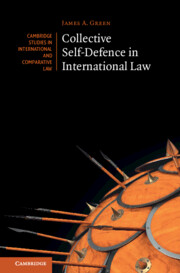Book contents
- Collective Self-Defence in International Law
- Cambridge Studies in International and Comparative Law: 184
- Collective Self-Defence in International Law
- Copyright page
- Dedication
- Contents
- Acknowledgements
- Table of Treaties
- Table of Cases and Arbitral Awards
- Introduction
- 1 Delineating Collective Self-Defence
- 2 The History and Development of Collective Self-Defence
- 3 The Requirements Shared by Individual and Collective Self-Defence
- 4 The Purported Declaration and Request Requirements for Collective Self-Defence
- 5 The Issuer of a Collective Self-Defence Request
- 6 The Manner and Form of a Collective Self-Defence Request
- 7 Collective Self-Defence Treaty Arrangements
- 8 The Relationship between Collective Self-Defence and Military Assistance on Request
- Conclusion
- Bibliography
- Index
- Cambridge Studies in International and Comparative Law
4 - The Purported Declaration and Request Requirements for Collective Self-Defence
Published online by Cambridge University Press: 04 January 2024
- Collective Self-Defence in International Law
- Cambridge Studies in International and Comparative Law: 184
- Collective Self-Defence in International Law
- Copyright page
- Dedication
- Contents
- Acknowledgements
- Table of Treaties
- Table of Cases and Arbitral Awards
- Introduction
- 1 Delineating Collective Self-Defence
- 2 The History and Development of Collective Self-Defence
- 3 The Requirements Shared by Individual and Collective Self-Defence
- 4 The Purported Declaration and Request Requirements for Collective Self-Defence
- 5 The Issuer of a Collective Self-Defence Request
- 6 The Manner and Form of a Collective Self-Defence Request
- 7 Collective Self-Defence Treaty Arrangements
- 8 The Relationship between Collective Self-Defence and Military Assistance on Request
- Conclusion
- Bibliography
- Index
- Cambridge Studies in International and Comparative Law
Summary
In the 1986 Nicaragua case, the International Court of Justice famously took the view that two additional criteria exist in customary international law for the exercise of collective self-defence, alongside the criteria that it shares with individual self-defence. These purported additional criteria have been commonly repeated in scholarship since. First, it is said that the state that has been attacked must ‘declare’ that it has been so attacked. Second, it must ‘request’ aid in its defence. This chapter sets out the manner in which the Court identified these requirements and whether it considered them to be legally determinative or merely evidentiary. It then goes on to examine state practice/opinio juris, to test whether the requirements indeed can be identified as rules of customary international law. It is argued that the first of those asserted requirements and declaration, in fact, has no legal basis. In contrast, it is argued that the issuance of a request is, as the Court indicated, a binding requirement for the exercise of collective self-defence.
Keywords
- Type
- Chapter
- Information
- Collective Self-Defence in International Law , pp. 140 - 168Publisher: Cambridge University PressPrint publication year: 2024



